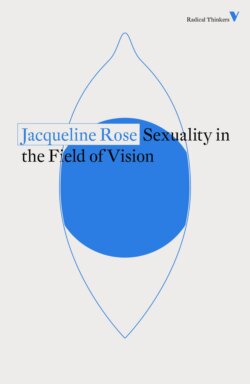Sexuality in the Field of Vision

Реклама. ООО «ЛитРес», ИНН: 7719571260.
Оглавление
Jacqueline Rose. Sexuality in the Field of Vision
SEXUALITY IN THE FIELD OF VISION
Contents
Acknowledgements
Introduction. Feminism and the Psychic
1. Dora—Fragment of an Analysis
The case of Dora
‘In fact she was a feminist’
Word-presentations and thing-presentations
The question of femininity
2. Feminine Sexuality: Jacques Lacan and the école freudienne
I
II
3. Femininity and its Discontents
Components of the culture
Femininity and its Discontents
Psychoanalysis and History. The History of Psychoanalysis
Feminism and the Unconscious
Utopianism of the Psyche
4. George Eliot and the Spectacle of the Woman
5. Hamlet — the ‘Mona Lisa’ of Literature
I
II
III
6. Julia Kristeva — Take Two
I ‘Only the superego must see the light of day’12
II ‘A freudful mistake’32
III ‘I hate Maria and when I see her portrait. I go down on my knees’41
IV Feminism and its fantasies
V ‘The King is with the body’61
7. The Imaginary
I
II
III
IV
8. The Cinematic Apparatus — Problems in Current Theory
I
II
9. Woman as Symptom
10. Sexuality in the Field of Vision
Notes
Bibliography
Index
Отрывок из книги
Jacqueline Rose
Introduction Feminism and the Psychic
.....
In relation to psychoanalysis, feminism therefore finds itself with a dual inheritance: the quarrel over femininity in the thirties, but equally important, the terms of what was already then the more explicitly political debate. Read ‘ideology’ as ‘femininity’, ‘cultural norms’ as ‘the family’ and you produce the position of Shulamith Firestone, for whom psychic conflict — the problem of female identity — is the direct reflection of institutionally regulated forms of control (the link runs historically as well as theoretically from both the culturalists and the radical Freud).15 Add the question of femininity to Fenichel’s concern to insist, against this reduction, on the importance of the unconscious and sexuality to any political psychoanalysis, and you have the precise intervention for feminism made by Juliet Mitchell in 1974. The dialogue between psychoanalysis and feminism is prefigured in this earlier, and still unresolved, debate. When someone like Elizabeth Wilson objects to any consideration of sexuality which cannot be mapped directly onto the immediately observable forms of gender inequality and oppression, her argument merely unwittingly repeats a historical and theoretical tension one half of which it blithely presents as a contemporary political fact.16
The same tension might explain the constant side-stepping of psychoanalysis and feminism in their mutual relation within recent Marxist debate. Thus Perry Anderson dismisses the feminist turn to Freud as a ‘precarious resort to less scientific bodies of thought [than socialism]’; Fredric Jameson overlooks the links between psychoanalysis and feminism in a book devoted to the place of the unconscious in cultural form (although radical feminism is recognised, it is later re-absorbed into a priority of class division and the category of the subject is dismissed as ‘anarchic’); Terry Eagleton about turns at the end of Literary Theory, and posits socialism and feminism over and above the forms of analysis, including psychoanalysis, he has covered in the book.17 In Jameson’s case, psychoanalysis returns in a footnote via Reich as a possible path to the analysis of the collective fantasies of religion, nationalism and fascism. In Anderson’s case, the moral-aesthetic utopias of the Frankfurt school, and in particular Habermas, appear — once psychoanalysis has been divested of its feminist interest — as the political end-point of the book. As indeed they do for Eagleton at the close of his chapter on psychoanalysis and the literary text.18 What is at issue here is not the political impetus of these books, but something which looks like a conspicuous omission or marginalisation of a crucial political link. And it seems to come in direct response to that moment when feminism brings the most fundamental problems of the psychic back onto the political agenda. It is as if feminism can be acknowledged as part of a critique of Marxism, and psychoanalysis can be incorporated into an account of collective fantasy, but they cannot be taken together. For then the concept of psychic life which accompanies the feminist challenge to sexual division presents itself too starkly against the terms of a traditional political critique. The unconscious as ideology (its present oppressiveness), or as pleasure (its future emancipation), but not something which hovers uncomfortably in between. This was the problem in the thirties as it re-presents itself to Marxism, and also feminism, today.
.....